Kamala Harris, For the People
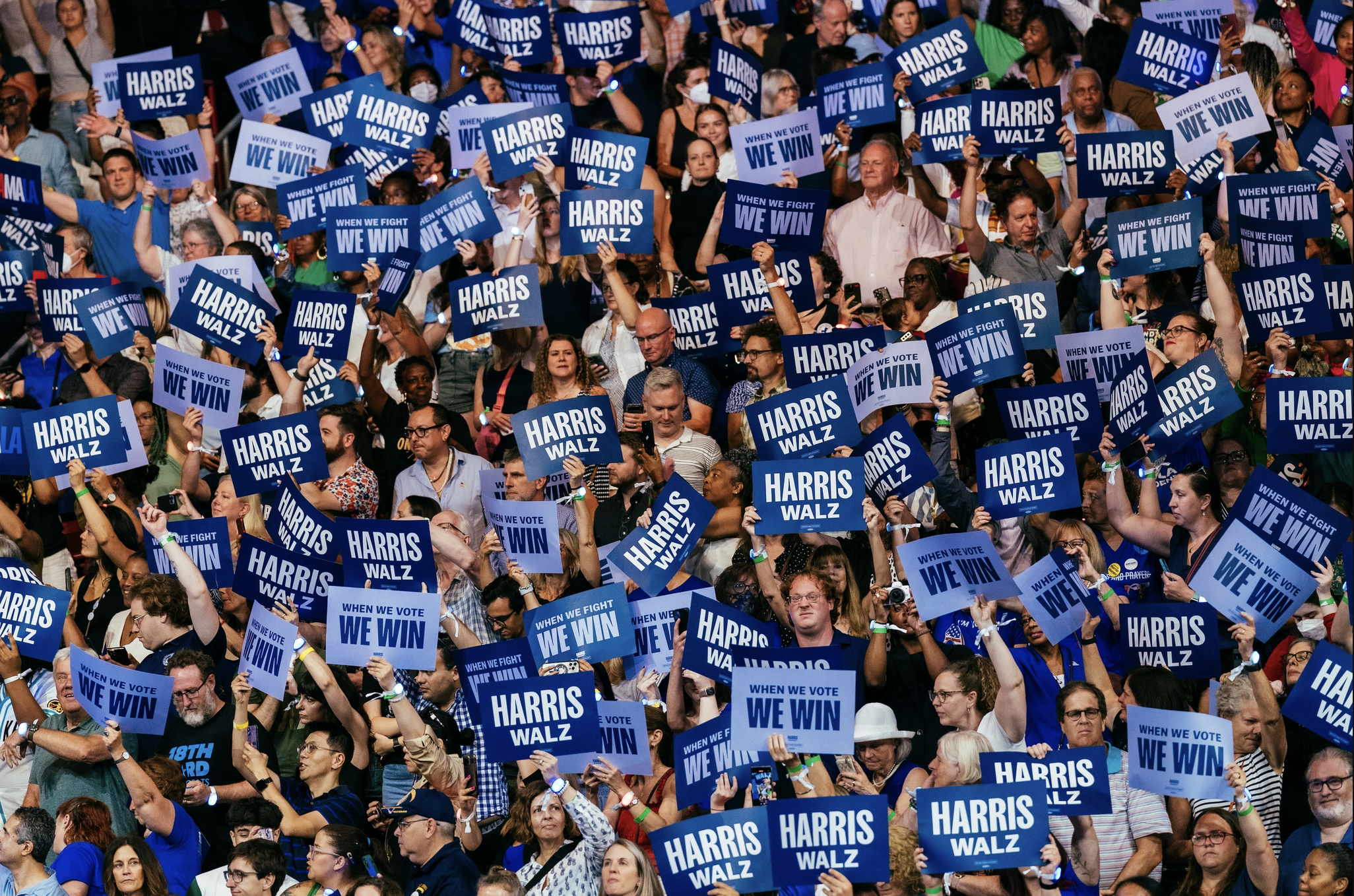 Kamala Harris/X
Kamala Harris/X
By Jeremy Kinsman
August 25, 2024
Americans have seemed in the digital age to live in the moment; driven by memes, tropes and “likes”. But America anchors its identity and sense of purpose in its history as a nation, sometimes romantically misremembered. Still, it rightly holds itself high as probably the only major country whose organizing principle is dedicated to a proposition that all humans are created equal, which, of course, has been repeatedly challenged, including by a Civil War.
The US has, at the same time, always hosted and championed relentless change, as citizens devote their talents and energies to the opportunities, especially material, of the present. A virtual civil war among Americans today is reflected in the presidential election of 2024, divided over the effects of such relentless change on the distribution of entitlements and opportunities, and over conflicting partisan views of the role of the state itself in the lives of its citizens.
But make no mistake: this isn’t primarily an election about competing policy priorities and the classic GOP-Democratic debate about big vs. small government. It’s about whether America will continue to be a democracy. The GOP candidate, Donald Trump, staged a failed, deadly coup attempt and has promised to eliminate crucial checks and balances on presidential power, even joking about ending voting altogether.
(Trump has denied that his plea to Christian evangelists to come out and vote just one more time, and “It’ll be fixed, it’ll be fine, you won’t have to vote anymore” meant he would end further elections. His approach to the end of his last term in office argues against that denial).
All of these themes were on display at the extraordinary Democratic National Convention in Chicago.
For decades now, because of the prioritization of the primary process and the parties’ wish to avoid public bloodbaths, US political conventions have been pep rallies rather than nomination contests to be decided on the convention floor, festive rather than substantive. Serious policy debate has occurred rarely during conventions in recent decades, most vividly over American wars. The last time a party convention decided its candidate by vote on the floor was 1960, when John F. Kennedy arrived in Los Angeles with a lead in committed delegates, but short of a majority. He reached it on the first ballot over Lyndon Johnson, whom Kennedy then chose as his running mate.
Anxiety ahead of this DNC prompted comparisons to the Democratic convention in Chicago in 1968, when America was polarized by the Vietnam War and reeling from two assassinations, the advent of generational power transfer and a revolution in mores that was shaking society.
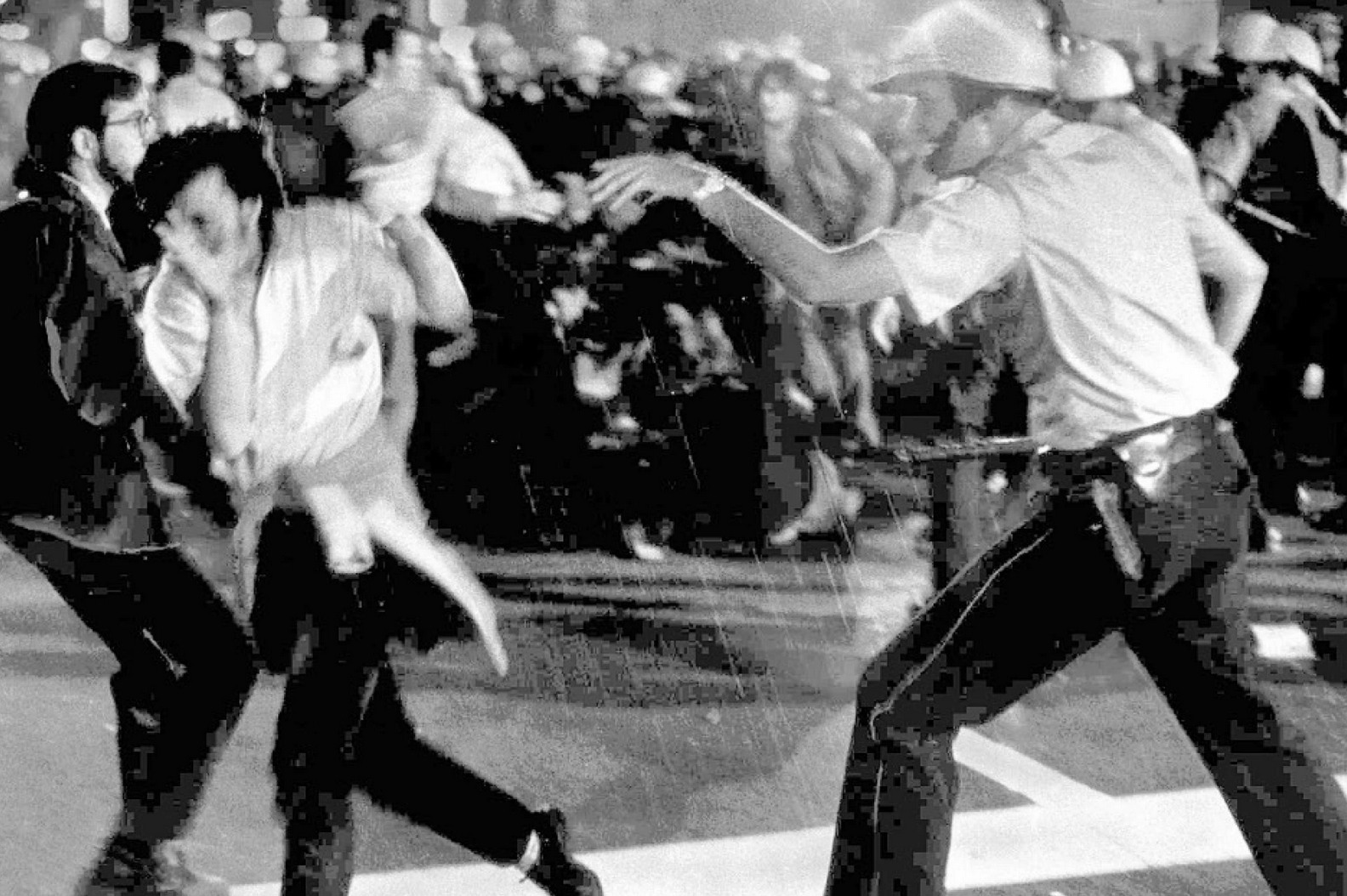 Riot police and protesters outside the 1968 Chicago DNC/AP
Riot police and protesters outside the 1968 Chicago DNC/AP
But American society, and its preoccupations, have been transformed since the turbulent decade of the 1960s.
In the 1960s, fewer than 10% of Americans supported interracial marriage, whereas today over 90% do. Gay marriage was then a fantasy. Opposition to it has collapsed today, outside Trump’s evangelical Christian supporters. The US Supreme Court decision in 1973 on Roe v Wade that abortion should be legal in all or most cases remains supported by 63% of Americans, but Donald Trump engineered its severe limitation by his conservative Supreme Court appointees.
Most emblematically, sixty years after the 1964 Democratic convention saw the landmark intervention by Fannie Lou Hamer demanding to be seated as a Black woman, Democrats in 2024 united in joyous support for Kamala Harris, their second Black nominee, who would also be the first woman president.
As we know, unprecedented events led to the withdrawal under pressure of Joe Biden’s quest for a second term after he had already secured his party’s nomination. A large majority of Americans had believed Biden was too old at 81, even though his adversary was himself 78, a double standard possibly rooted in the anxiety over the prospect that Trump might win a second term by default. Former Republican contender Nikki Haley hit the spot for many when she issued a primary campaign ad about “grumpy old men.” Haley later presciently quipped that the first party to retire its 80-year-old candidate would win the election.
Democrats had been especially demoralized by President Biden’s disastrous June 27 debate performance, widely attributed to age-related frailties. Most had hoped he would decide not to pursue a second term after all, but out of love and appreciation of his career of public service, hesitated to push him, until ominous polls prompted a critical mass of momentum within his own party in favour of a withdrawal.
At the Republican convention in Milwaukee in mid-July, nominee Donald Trump had warned in a rambling and divisive 90-minute address that only he could save America from the catastrophe heralded by the Democrats’ commitment to still more social change. Having survived an assassination attempt only days before the convention, he accepted the delegates’ emotional celebration of his leadership as a bulwark against further disruptive change to the old social order. Trump supporters left Milwaukee on a giddy high of certainty that he would sink his shaky opponent, supported by a significant lead in opinion polls.
Then when Biden announced on July 21 that he was bowing out, Vice-President Kamala Harris’ supporters moved fast to secure, with Biden’s help, her place at the top of the ticket.
Vice-President Harris was a blank slate for most Americans. But among Democrats there was a massive surge of enthusiasm. In days, her introductory performance in her new role turned their despondency into hope that she could beat Trump. Trump, with typical implausibility, tried to define her as a person of confused identities, and limited intelligence. Harris laughed, making clear what she stood for, and who she is, underscoring the contrast between the two.
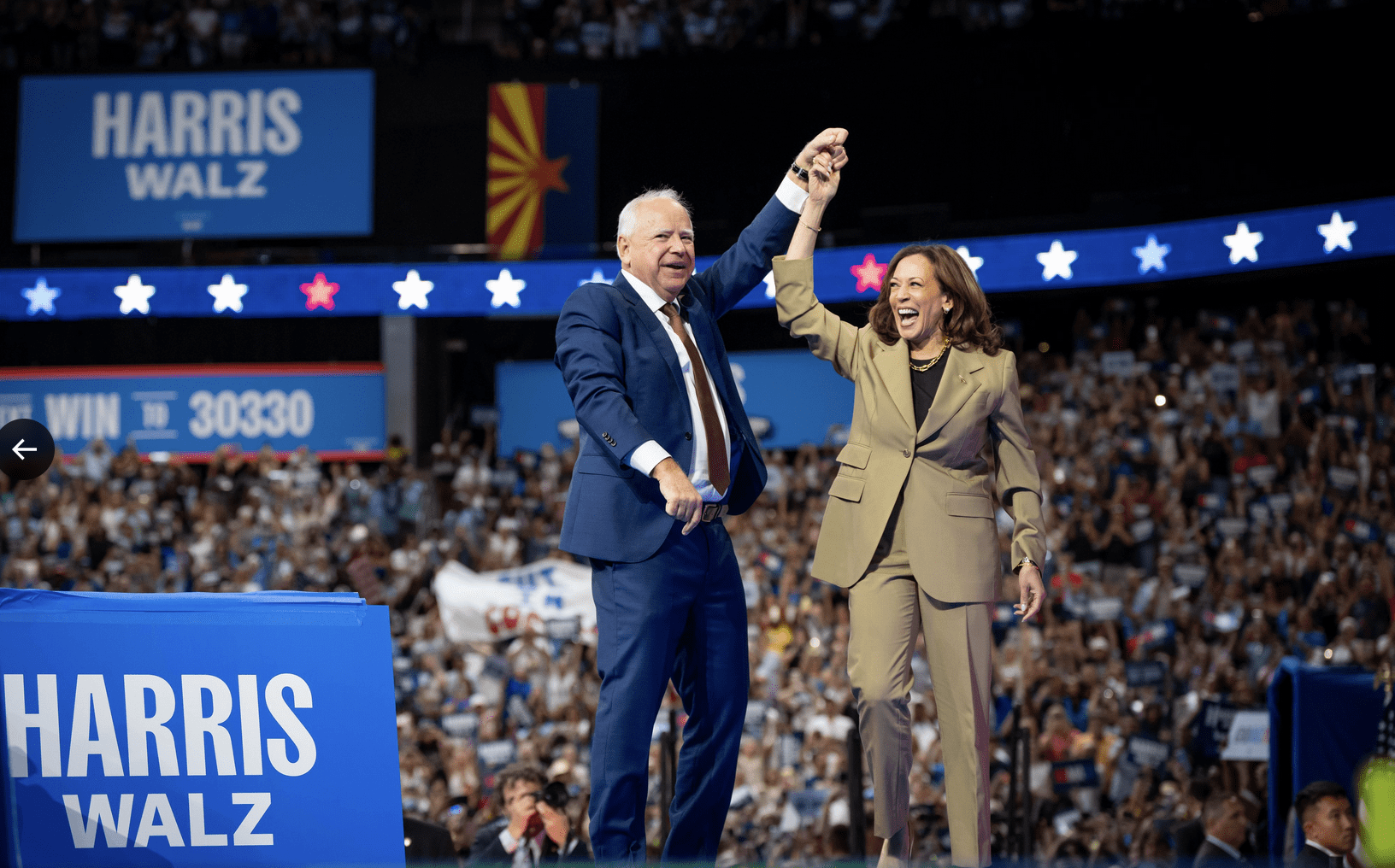 Kamala Harris/X
Kamala Harris/X
Harris made a surprise choice for her running mate; folksy, entertaining, competent, and drama-fee Tim “Coach” Walz, a seasoned Midwestern governor (Minnesota) and 12-year Congressman with a Jimmy Stewart personality and a long record as a public school teacher and National Guardsman. A choice that many saw as counterintuitive now seems brilliant.
By the time the Democrats’ convention convened on August 22, the campaign of Kamala Harris had caught fire, energizing the base, raising stratospheric financial support, galvanizing media, and igniting the national imagination.
It all promised a truly epic show in Chicago, if organizers could bring off a compelling production, and if Harris and Walz’s performances could meet expectations.
The replacement of 81-year-old Biden with 59-year- old Harris to compete against 78-year-old Trump gave the election the inflection of a “generational” shift, like John Kennedy’s in 1960, Bill Clinton’s in 1992, or Barack Obama’s in 2008.
Demographic change is in play. An enormous number of 2024 voters were not even alive at the time of Clinton’s election. (He made a telling point when he reminded the audience this week that at 78, 32 years after being elected, he is still younger today than Trump.) Former Trump aide Anthony Scaramucci a few weeks ago (on the The Rest is Politics, USA podcast) cited statistics that since the 2016 election, 20.2 million baby boomers who had been trending Republican had died. Meanwhile, about 40 million younger Americans Millennials (born 1981-96) and Gen Z (born after 1997), were succeeding them. These younger cohorts trend Democratic, but were unenthused to turn out for Joe Biden.
The Chicago convention targeted them with music, testimonials from familiar entertainment icons, and from children, in a upbeat and seamless production. The traditional roll call was reinvented as a dance party, which may be one reason why the DNC’s ratings eclipsed the RNC by 15%.
The convention’s job was to let America see and know Kamala Harris. For three nights, multiple icons came to the podium to vouch for her character, presidential prerequisites, and readiness. The performances by ex-presidents Obama and Clinton, Michelle Obama, Hillary Clinton, Nancy Pelosi, the electrifying Alexandra Ocasio-Cortez, Transportation Secretary Pete Buttigieg, and several others, including Oprah Winfrey, were compelling, each in its way. It is noteworthy by comparison that of Trump’s 23 cabinet nominees from 2016, only 4 endorse him. Previous GOP presidential nominees stayed away from his Milwaukee event.
In Chicago, Joe Biden came to give the first evening’s keynote address. Republican commentators implied that Biden was kicked aside in a coup, but it was obvious that the crowd in the United Center believed that Biden’s wrenching, patriotic decision to put party and country first was politics at its best, and there was no question it had put the Democrats back into contention, indeed, into an intoxicating if slight lead in the national polls. “Thank you, Joe,” was among the convention’s dominant themes.
Biden’s speech cited his administration’s accomplishments, which have been impressive, from Covid to climate change and green energy. US macroeconomic performance has been, in general, highly successful. (Indeed, as Bill Clinton reminded delegates, since 1990, Democratic administrations have created 50 million jobs, while Republicans have created 1 million.)
But as we all know, the felt increase in inflation, the cost of living, at the supermarket, for housing, and for everyday life, is for many people the crux of the economic issue. Kitchen-table home economics, and James Carville’s 1992 war-room adage, “It’s the economy, stupid,” remain top of mind.
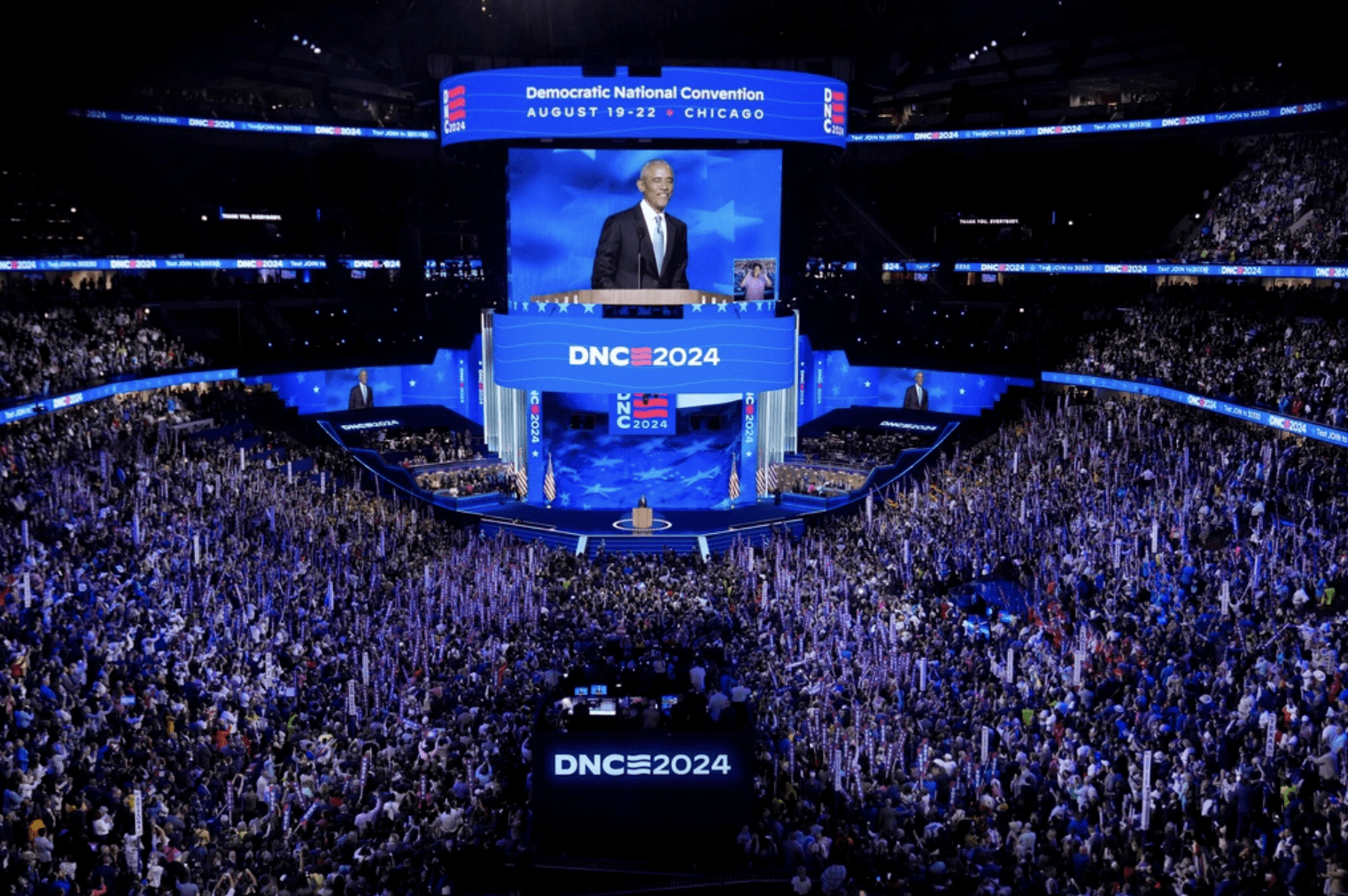 AP
AP
But values issues, “Who we are,” and “What we care about,” resonated most over four days in Chicago. “When we fight, we win,” was the Harris dictum that ran through the proceedings, in defence of bedrock programs in the community’s interests and individual rights, especially for freedom in reproductive rights. The “fight” was wound into American history, commanding the responsibility to rise to — as Barack Obama put it, quoting Lincoln — “the better angels of our nature” to end division, and to respect all citizens’ opinions.
This appeal in the synchronized speeches was meant in part to coax moderate Republicans and independents to remember American neighbourliness, at a time of deliberate polarization. Several Republicans came to the podium to authenticate the appeal’s inherent worth.
Centrally, and repeatedly, the role of American women was denoted as the backbone of both the party’s, and the country’s, strength. Michelle Obama held nothing back in her contempt for Trump’s “smallness” in this respect. She movingly paid tribute to the strength of her mother, Marian Robinson, who passed away in May, and whom she and Barack Obama compared to the courage and inspiration provided by Shyamala Gopalan Harris to her daughters, Kamala and Maya.
Where did the world come in? Barack Obama reminded delegates that their success “doesn’t matter just to the people in this country. The rest of the world is watching to see if we can pull this off…We shouldn’t be the world’s policeman, but we can be a force for good.”
It was a sharp but known contrast to Trump’s isolationist and protectionist stance to the rest of the world, a recurring theme, as was Trump’s disposition to court dictators.
Pro-Palestinian protests outside the United Center never amounted to much of a disruption. The parents of a young American, Hersh Goldberg-Polin, taken as hostage at the fateful music festival in Israel on October 7, broke the convention’s hearts with their plea for the settlement of this “humanitarian issue” which holds “a surplus of agony on all sides,” to “stop despair in Gaza,” and enable release of the 109 remaining hostages. Kamala Harris crafted a formula of balance on the crisis in her acceptance speech, to preserve for now an adequate degree of unity at the convention. She matched deference to Israel’s security needs to a tone of anger about Gazan lives and commitment to Palestinian rights that did mark a determination more strenuous than the impression of President Biden’s.
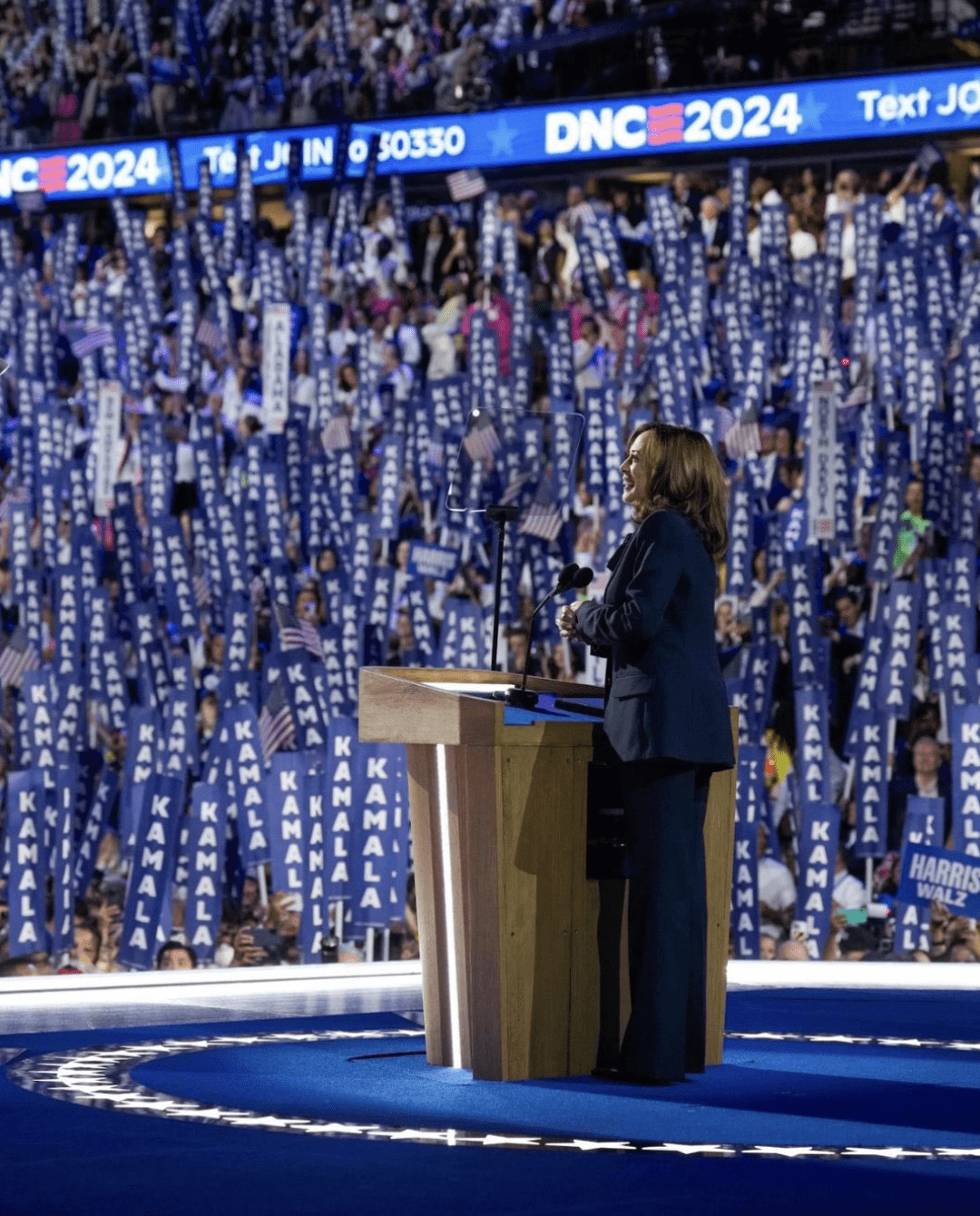
Kamala Harris/X
And Harris’s speech was a blockbuster. If the art of politics relies on performance, she is a born master. She called Trump an “unserious” man. She sternly laid out a credo of belief in America in quite nationalistic terms that promised she would ensure America remained “number one,” though she stressed her pragmatic and “common sense” approach to international relations and to governance in general. She is resolute in her support for Ukraine.
Canadians, listening for concern for relations in the North American neighbourhood, didn’t hear anything. Harris has already made clear her vivid opposition to Trump’s plan for an across-the-board US tariff on all imports. In fact, in wistful memorializing of young Kamala’s childhood, the six teenage years she spent in Montreal were air-brushed away (as were the many trips Tim Walz made to China when he was a young teacher).
American adversaries will be taking note of her tough talk: “As commander-in-chief, I will ensure America always has the strongest, most lethal, fighting force in the world.” The hall responded with chants of “USA, USA.” But Harris channeled continuing Democratic patriotic engagement with the wider world, in opposition to Trump’s isolationist stance. She lauded the ideal of American openness that drew her own parents to America.
Amid enormous energy and enthusiasm in the United Center, speakers exhorted delegates to work intensely from now until Nov 5 to prevail. Many remember that on August 20, 2016 Hillary Clinton had a national polling lead of 5.7%. Vice President Harris had built a national lead in the polls of a few % when the convention opened. Momentum is king, for as long as it lasts.
They know that Harris has yet to be tested on the substantive issues, in news conferences, interviews, and in the possibly decisive September 10 debate with Trump.
He has avoided substantive discussion, indulging mainly in personal attacks on Harris. He depicts her as the incumbent in an age of anti-incumbency. She aims to transfer the burden of incumbency back to Trump, declaring the country need only recall his chaotic 2017-21 term. As Barack Obama said, “we have seen that movie – and we all know that the sequel is usually worse.” Democrats repeatedly mocked the toxic “Project 2025” outline of autocratic policy proposals prepared to guide a Trump return, that he now disowns, but that everybody knows reveals his radical intentions.
It has been a race without precedent in drama and stakes, as Kamala Harris emphasized, “not only the most important of our times, but of our nation’s history.”
The Globe and Mail saw the possibility of a real political inflection point that could substitute “a return of optimism to politics” for a political culture driven by outrage and anger, typified by Donald Trump’s divisive populist campaigns. The replacement of “can-do” for Trump’s “un-do,” if successful, could herald a rally of optimism within other embattled democracies.
The New Yorker writer Susan Glasser remarked the other day, “What a time for a journalist to be alive.” I guess. But with drama, comes stress. Buckle up.
A longtime Americanist by residence and profession, Policy Contributing Writer Jeremy Kinsman also served as Canada’s Ambassador to Russia, Italy and the European Union and as High Commissioner to the UK. He is a Distinguished Fellow of the Canadian International Council.
